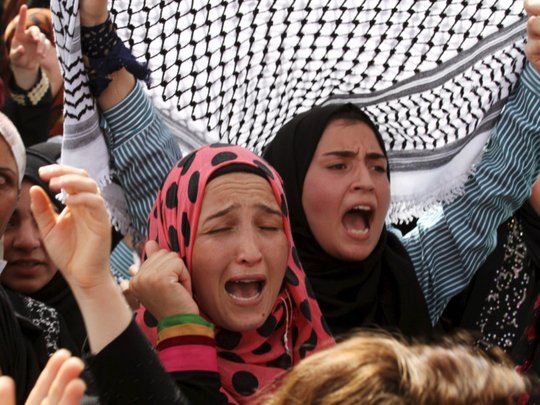
Douma: Palestinians in Douma held their third funeral in six weeks, as they buried victims of an arson attack in which Jewish extremists have been accused. First, they buried a toddler, Ali Dawabsheh, then his father, and on Monday, they buried his mother, Riham Dawabsheh, each dying of injuries suffered in the fire on July 31.
The funeral for Riham Dawabsheh, 27, a high school teacher, was markedly different because women participated. For many, it was their first experience of a funeral for a female victim of political violence. The unusual sight underscored the rarity of such deaths in the West Bank, where young men are typically the victims of violence.
Hundreds of Dawabsheh’s colleagues, students and extended family poured into a roomy house and courtyard reserved for women in the hillside West Bank village. But instead of staying there, as Palestinian women typically do at funerals, they viewed the body and marched to the cemetery, forcing male officials to hastily organise space for them, then held a protest march.
“This is the first funeral I see like this,” sobbed Hamda, 30, a distant relative. “We used to hear about death before, on the television, of the martyrs, but this is somebody we know.”
“Praise God, she’s like a bride. All of Palestine has come to say goodbye,” Hamda said, as she tearfully looked around the crowd of women.
Inside the house where the women had gathered, a female preacher, Umm Musab, addressed the crowd. “Those who submit to the fate that God has given them will enter heaven 500 years earlier than everybody else,” she said.
“By God, I submit,” Dawabsheh’s elderly mother-in-law whispered. “Amen, Lord, Amen,” she said. But then she burst into tears, counting the mounting losses of her family. Her 18-month-old grandson, Ali, was burned to death the night of the fire. Her son, Saad, 32, died of his injures August 9, and now her daughter-in-law.
Her other grandson, Ahmad, 4, is still in serious condition, with burns covering much of his body.
Israel arrested a number of Jewish extremists suspected of belonging to a network that had encouraged acts of arson. But the government has imposed a news blackout on the investigation into the Douma attack, so it remains unclear if any of those in detention are suspected of any connection with it.
On Monday, Prime Minister Benjamin Netanyahu of Israel expressed his condolences to the Dawabsheh family in a statement from his office. He said security services were doing their utmost to arrest the attackers.
For Palestinians, it mattered little. “We all live in terror,” Hamda, the distant relative, said as women around her nodded.
“There’s nobody to protect us,” she said. “My girl sleeps next to me and says, ‘Mama, if we die, can we die together?’”
As women kept pouring in to the mourning house, it appeared that they had negotiated with male officials to view Dawabsheh’s body. But it touched off chaos: As men carried Dawabsheh’s flag-wrapped body into the courtyard, women crowded and jostled to have a look. Dawabsheh’s sisters-in-law wept in a corner, saying they weren’t able to see her.
Her former students, still in their striped school uniforms, burst into gulping sobs. “It was scary to see my teacher like that,” cried Amal, 17, hugging a friend. “I saw her face,” she gulped. “Her face used to be clear, now it’s yellow.”
The women then poured out of the house, following the men carrying Dawabsheh’s body to the cemetery. Some carried flags of the militant Islamic group Hamas, others posters of Dawabsheh. After the burial, a smaller crowd of younger women marched down Douma’s tiny streets, chanting and vowing revenge.
They grinned and clutched each other’s hands, suggesting this was an unusual excursion. One marcher, her face covered in a black veil, further suggested the rarity of such an event, as she called out chants that women repeated after her: She was reading off a piece of notepaper.
— New York Times News Service












